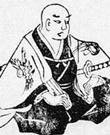.

Basho, Matsuo 1644-95 Poet, born in Ueno, Japan. Influenced by Zen Buddhism he became a master of the haiku and started his own school, but later retired to a hermitage.
Basho journeyed extensively, and composed his book of travels 'The Narrow Road to the Deep North'
in a mixture of poetic prose and haiku. Basho demanded that a haiku must contain
both a perception pf some eternal truth and an element of contemporaneity.
Chinese poet who wrote under the title 'Liao-chai chih-i' (Strange Stories from a Chinese Studio) 431 charming stories of the supernatural.
P'u Sung-ling humanized supernatural
spirits so that they became - for the first time in Chinese fiction - likeable. He also
wrote the longest Chinese novel, 'Hsing shih yin yuan', describing the unhappy marriage of a shrew and her henpicked husband.
He won fame for his lightening speed in haiku compositions, he is said to have turned out 23,500 haikus in a single day in 1684, or 16 per minute.
But Saikaku is best known for his novels,
written with satirical humour. His masterpiece is 'Koshoku gonin onna' (Five
Women Who Loved Love) describing the loves of women of the merchant class rather than prostitutes; this
was the first time women of this class were given such attention.
In 1565 Tasso entered the service of Cardinal Luigi d'Este, and was invited to the court of his brother, Alfonso, Duke of Ferrara. While there, he wrote his pastoral drama "Aminta," and in 1775 finished his great epic, "La Gerusalemme Liberata," describing the first Crusade, which was published in 1581.
In 1577 Tasso was imprisoned by Alfonso in a convent, from which he escaped. In 1579 he returned to Ferrara, but was confined in a madhouse, where he remained until 1586 when he was released at the intercession of the Duke of Mantua and other princes. In 1594, Clement VIII summoned him to Rome to receive a laurel crown, but he died soon after his arrival in 1595.
|

